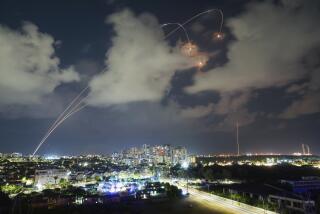Missile Decision: Go Slow
- Share via
Concerns over the efforts of North Korea, Iran and other unfriendly states to develop long-range missiles justify U.S. plans to create a National Missile Defense system that would detect, track and destroy attacking missiles outside Earth’s atmosphere. But paramount priority must go to building a system that works. The testing program for the NMD system has exposed a number of uncertainties, which is why Philip E. Coyle, the Pentagon’s director of operational testing and evaluation, urges that the pace of NMD be slowed.
Coyle’s concern, shared by others, is that President Clinton’s decision on whether to deploy NMD, expected this summer, puts “unrealistic pressure” on the project. The history of development programs, Coyle warned in a report to Congress, shows that those that are “schedule-driven” rather than based on results usually end up in trouble. There have so far been three test flights in which interceptor missiles tried to destroy surrogate enemy warheads. Coyle cited 10 problem areas in those tests, including the failure of the surrogate missiles to replicate the radar image or trajectory of missiles that North Korea or Iran might fire.
NMD is a complex system of radars, sensors and missiles. Its cost for development, production, construction and operations is projected at $26.6 billion. Administration officials say Clinton’s decision will be based on whether the system works, is affordable and is justified by the perceived risk and from the standpoint of arms control. But testing of the system won’t be complete by June, when Defense Secretary William S. Cohen is supposed to make his recommendation to Clinton. There will still be enough unknown about NMD to warrant postponing a decision.
An election year isn’t the ideal time to decide on a project as momentous as NMD. Recognizing this, some Republicans have wisely urged delay. Others threaten to politically beat up Clinton and Vice President Al Gore if deployment isn’t approved. The prudent course in deciding clearly is to wait until NMD’s effectiveness is demonstrated. A flawed system that wouldn’t protect Americans or dissuade aggressors would only be a costly sham.
More to Read
Sign up for Essential California
The most important California stories and recommendations in your inbox every morning.
You may occasionally receive promotional content from the Los Angeles Times.













